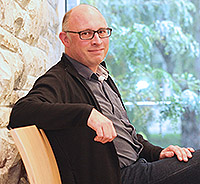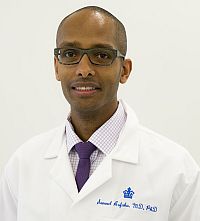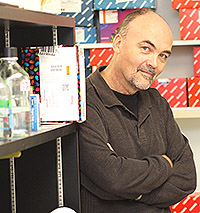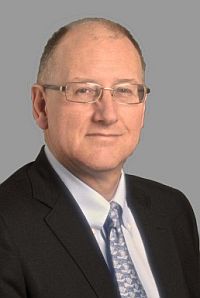Inflammation is becoming increasingly popular as a “buzzword” for health claims and advice. It has been implicated in a number of chronic and age-related conditions, including diabetes, rheumatoid arthritis, cardiovascular disease, neurodegenerative diseases, and even depression and cancer. On the other hand, inflammation is part of the body’s natural response to infection and tissue damage, and it is crucial to the healing process.
You are invited to the Lawson’s Café Scientifique, a free community event providing an informal opportunity to get involved with science. Hear a panel of expert researchers explore how inflammation affects our health and how this knowledge can be applied to improve health care. Guests are then encouraged to ask questions as part of an open-forum discussion to gain insights from the speakers, and from one another.
Download the event poster.
Presented Talks
- “Molecular signatures: How do we listen to the music of inflammation?”
Dr. Chris McIntyre
- “The effects of chronic inflammation on cancer”
Dr. Samuel Asfaha
- “Coming to grips with curling fingers: A cause and potential treatment for fibrosis of the hand”
Dr. David O’Gorman
- MODERATOR – Dr. David Hill
Registration
Free community event hosted by Lawson Health Research Institute.
PLEASE NOTE: Registration for this event is now full.
Email @email to be added to the event wait list. Please include the names of all individuals who wish to be added to the wait list. We apperciate your interest in Café Scientifique.
Event Information
Date: Wednesday, October 12, 2016
Time: 7 to 9 p.m.
Location: Windermere Manor (The Grand Hall), 200 Collip Circle, London, ON N6G 4X8
Speaker Biographies
Dr. Chris McIntyre attended Charing Cross and Westminster Medical School, London UK, qualifying in 1990. Specializing in Nephrology he trained initially as a Registrar at University College London and subsequently as Lecturer at St Barts and the Royal London Hospital. He completed an intercalated period of predominantly laboratory based research investigating the effects of novel vitamin D sterols on uremic bone.
In 1999 he was appointed as Consultant Nephrologist at the Royal Derby Hospital and subsequently as Reader in Vascular Medicine and then Professor of Nephrology at Nottingham University, becoming Head of the Division of Graduate Entry Medicine and Medical Sciences. Dr McIntyre led a team of multidisciplinary researchers focused largely on the pathophysiology of the widespread abnormalities of cardiovascular function and body composition in CKD patients. These studies included basic clinical science, natural history studies and the development and application of novel therapeutic strategies. These studies have increasingly focussed on the adverse consequences resulting from dialysis therapy itself and the improvement in outcomes by the reduction of preventable harm.
He has recently moved to his new role in Canada as Professor of Medicine and was awarded the inaugural Robert Lindsay Chair of Dialysis Research and Innovation at Western University, London Ontario. He also serves as Director of the Lilibeth Caberto Kidney Clinical Research Unit at London Health Sciences Centre, as Assistant Director of the Lawson Health Research Institute and is cross appointed as full Professor in the Department of Medical Biophysics at Western.
Dr. Samuel Asfaha is a clinician scientist who practices gastroenterology with a special interest in inflammatory bowel disease (IBD) and colorectal cancer.
His research focuses on the intestinal stem cells of the gut and aims to identify the cellular origin of colorectal cancer.
See Dr. Asfaha’s full scientist profile.
Dr. David O’Gorman was born and educated in Sydney, Australia. His interests in medical research began as a lab technician in the medical diagnostics industry. After undergraduate (B.Sc.) and graduate (M.Sc.) training in molecular biology and microbiology at Macquarie University, he completed a part-time PhD in cancer cell biology in the Department of Molecular Medicine at Sydney University in 2000. He moved his family to London in 2001 to pursue post-doctoral studies at the Lawson Health Research Institute, and was appointed to the Departments of Surgery and Biochemistry at Western in 2005. David is currently the co-director of Molecular and Cellular Research at the Roth McFarlane Hand and Upper Limb Centre at St. Joseph’s Hospital. His research is focussed on understanding the processes that regulate normal and abnormal tissue regeneration and repair, specifically in connective tissues of the hand and upper limb, to identify new treatment approaches for conditions that are difficult to correct by surgery.
See Dr. O’Gorman’s full scientist profile.
Moderator Biography
Dr. David Hill is the Scientific Director of Lawson Health Research Institute, one of Canada’s top ten hospital-based research institutes. To complement his role at Lawson, David is the Integrated Vice President of Research at London Health Sciences Centre and St. Joseph's Health Care London. At Western University, he holds the Lawson Professorship in Diabetes Research and the Weinstein Chair for Diabetes Research, and is a Professor in the Departments of Medicine, Physiology and Paediatrics. Dr. Hill’s research focuses on the generation of new insulin producing beta cells in the pancreas as a strategy for the reversal of diabetes.





